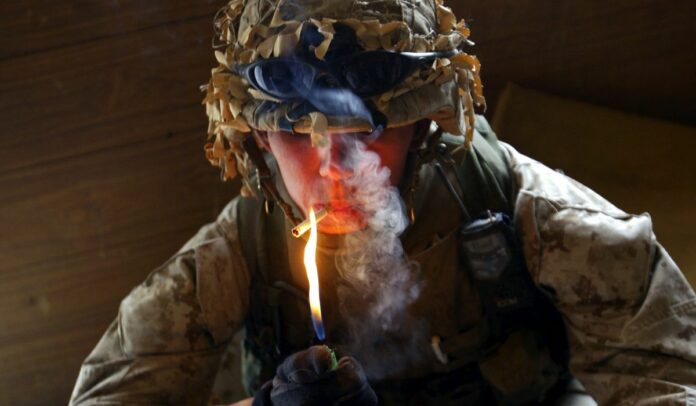Tobacco has been part of American military culture long before John Wayne led a platoon of recruits with a cigarette dangling from his lips in the 1949 movie “Sands of Iwo Jima.”
Throughout most of the 21st century, “Smoke ‘em if you’ve got ‘em” was a common refrain at Army posts around the world. The Pentagon went so far as to add miniature packs of cigarettes to field rations for troops.
But times change, and so does the Defense Department’s tobacco policy. Effective Aug. 1, the military will no longer sell tobacco products to any U.S. service member younger than 21.
The impending crackdown is the result of a provision tucked inside a $1.4 trillion spending package President Trump signed in December. The directive focuses solely on the sale of tobacco products at military retail centers and is not a blanket ban on tobacco products for those younger than 21.
But officials also say a bigger goal of the U.S. Army Public Health Center is to completely eliminate tobacco use from the service by 2025. Analysts say the goal is reachable, given that Defense Department surveys show only about 14% of active-duty military personnel say they are smokers.
Some in the wider U.S. military community, however, say it’s a matter of principle to allow soldiers to decide for themselves whether to light up or not.
Mike Plowman spent more than seven years in the Army and served as a platoon leader in the 1st Cavalry Division in Iraq. He supports the notion that those old enough to fight for their country should be old enough to make a decision about drinking a beer or buying a pack of cigarettes.
“I don’t understand why we wouldn’t trust them to make their own decisions,” Mr. Plowman said. “We’re not treating them like grown-ups.”
Arthur Rizer spent almost 21 years in the Army before retiring as a lieutenant colonel from the West Virginia National Guard. He once trained Iraqi special forces soldiers in Fallujah.
Now a senior fellow at the R Street Institute, a public policy research organization in Washington, Mr. Rizer said, “This is absolutely government run amok. I don’t think this is going to solve anything.”
Military health experts beg to differ.
Corey Fitzgerald, a social worker with the Army Public Health Center, said research shows that raising the legal age of sale to 21 is likely to reduce tobacco initiation and use.
“Nearly all smokers start out as children or young adults, and these groups are heavily targeted by the tobacco industry,” Mr. Fitzgerald said. “Early onset of tobacco use increases risks of smoking-related illnesses and death.”
The Trump administration apparently shares that point of view.
An initial draft of the law to ban the sale of tobacco to those younger than 21 included an exemption for members of the military, but the carve-out was removed by the time it was signed by President Trump, a nonsmoker.
“Our leadership agreed with public health advocates that the military should not be treated differently on this,” said Mr. Fitzgerald. “The health of our young soldiers is just as important as their civilian peers.”
The goal, he said, is to increase the health and readiness of the force. “Using tobacco, you’re not only hurting yourself; you’re negatively impacting national security and your availability to do what the country needs you to do,” Mr. Fitzgerald said.
Mr. Rizer said he agrees that cigarettes and other forms of tobacco are not healthy but worries that creating a “nanny state” program in this case may cause more problems than it solves.
“You’re going to have individuals who still smoke,” Mr. Rizer said. “You’re just going to create a black market.”
He said he started smoking because it helped alleviate the stress of combat. His commander recognized the health impact but created incentives such as offering a weekend in the quiet rear area for soldiers who stopped smoking.
“You can do things that have an impact. The military gives bonuses all the time for certain types of behavior,” Mr. Rizer said. “You can do this through smart public policy if you let people be adults.”
Mr. Plowman said boredom more than anything else causes a lot of military members to use tobacco.
He said he brought five or six rolls of snuff cans when he deployed to the Persian Gulf War and his wife sent him a fresh roll every other week.
“I dipped or chewed tobacco all through college. I later made my own decision to quit,” Mr. Plowman said. “You can look pretty stupid with half a can of ‘worm dirt’ in your bottom lip.”
Mr. Plowman, a cancer survivor, said he has no love for the tobacco industry but added that soldiers, sailors and Marines will make the right decisions if they are treated like adults, he said.
“Kids today are smarter than we were about all this,” he said. “They’ve already made a big decision in terms of personal growth and citizenship. They volunteered to serve their country. I don’t even know why this is an issue.”






